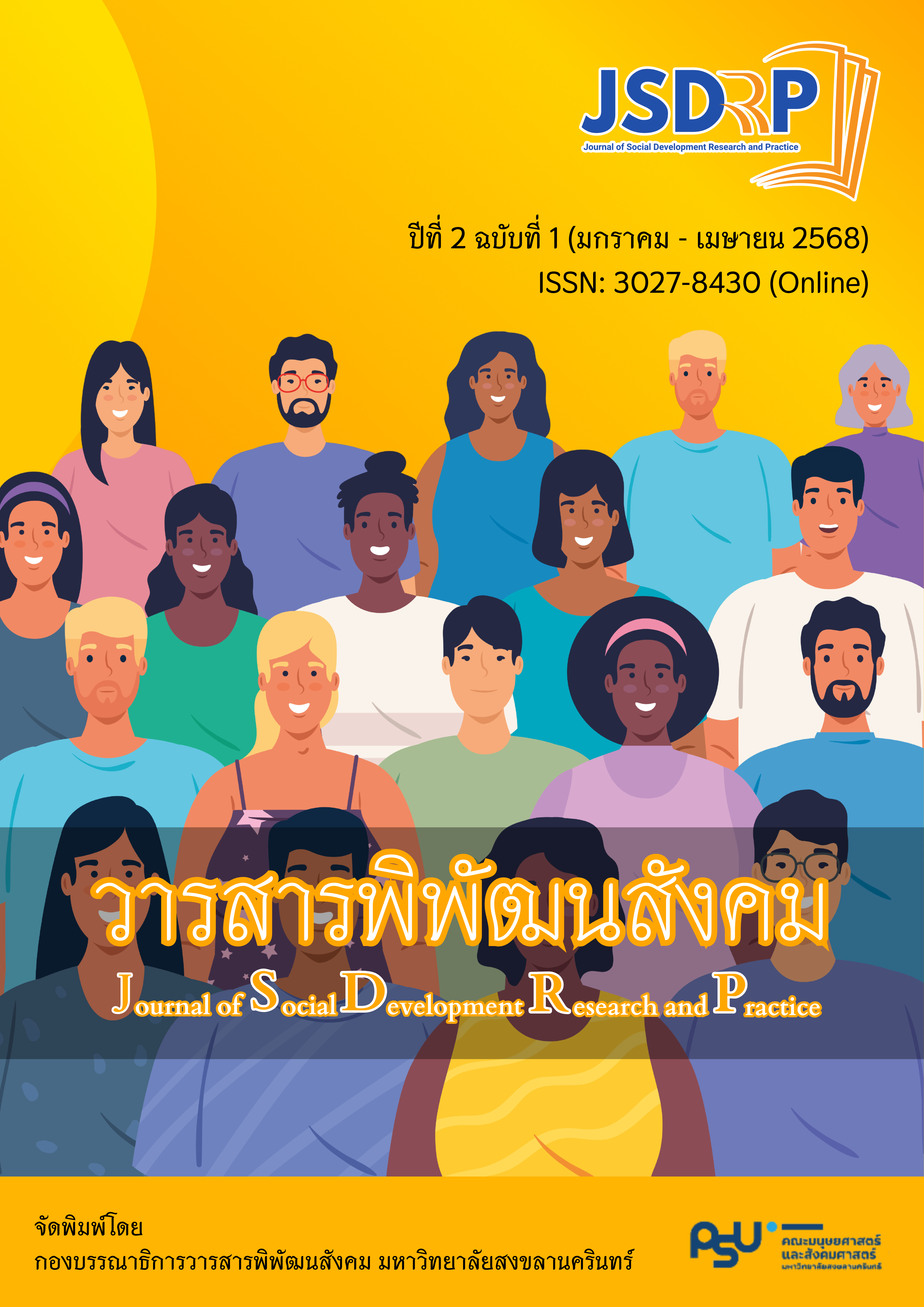Ta Pran Boon: Beliefs, rituals and inheritance. Case study of the Manohra Teerasak Banditsin So Sian Trang. Nong Bo Subdistrict, Yan Ta Khao District, Trang Province.
Keywords:
Ta Pran Boon, Belief, Rite, Inheritance, Make a vowAbstract
Purpose: 1) To study the history of Ta Pran Boon. 2) To study the beliefs and rituals of Ta Pran Boon. And 3) To study the inheritance of beliefs and rituals of Ta Pran Boon case study of the Manohra Teerasak Banditsin So Sian Trang. Nong Bo Subdistrict, Yan Ta Khao District, Trang Province.
Methodology: The researcher collected data from 10 key informants. Start by organizing your information. Categorize data according to the conceptual framework used in the research. and understand the information gathered. After collecting the data, the researcher will record in detail and then write a complete and descriptive version of the research.
Findings: Ta Pran Boon is an ancestor of the Manohra lineage who has passed away. There is an assumption and belief that the history of Ta Pran Boon originates from Tha Khae Temple, Tha Khae Subdistrict, Mueang Phatthalung District, Phatthalung Province. And the first successor of Ta Pran Boon is unknown. There are only beliefs and rituals of Ta Pran Boon that have been practiced continuously. Belief in Ta Pran Boon is a belief that has been passed down. which comes from love, faith, and respect for Ta Pran Boon The inheritance of beliefs and rituals can be passed on as children and as disciples.
Applications of this study: Conservation of arts, culture, beliefs, faith, rituals and inheritance regarding Ta Pran Boon has occurred. In addition, it makes the Nong Bo subdistrict community Yan Ta Khao District Trang Province has interested people who want to study and gain knowledge about Ta Pran Boon, causing the beliefs and rituals of Ta Pran Boon to remain with the community.
Downloads
References
ธวัช ปุณโณทก. (2528). วัฒนธรรมพื้นบ้าน : คติความเชื่อ. กรุงเทพฯ: จุฬาลงกรณ์มหาวิทยาลัย.
พระครูใบฎีกาโกวิท โกวิโท (จิตประสงค์), พระครูวิจิตรศีลาจาร, สิทธิโชค ปาณะศรี, มหาวิทยาลัยมหาจุฬาลงกรณราชวิทยาลัย วิทยาเขตนครศรีธรรมราช และสวัสดิ์อโณทัย. (2562). ศึกษาวิเคราะห์หลักพุทธธรรมที่ปรากฏในการแสดงโนราโรงครู. วารสารมหาจุฬานาครทรรศน์, 6(5), 323-341.
ภูมิ จิระเดชวงศ์. (2564). หิ้งครูหมอโนราและความสำคัญ. สืบค้นเมื่อ 23 กรกฎาคม 2566 จาก https://www.facebook.com/norahistory/posts/158456405962095
มานะชาติ คล่องดี. (2552). การศึกษารูปแบบการสร้างเครือข่าย ความเข้มแข็งทางสังคม ด้วยพิธีกรรมเหยาของชาวผู้ไท จังหวัดมุกดาหาร (วิทยานิพนธ์ปริญญามหาบัณฑิต). มหาสารคาม: มหาวิทยาลัยมหาสารคาม.
เยี่ยมยง สุรกิจบรรหาร. (2523). ความเป็นมาของโนรา ในพุ่มเทวา : ที่ระลึกงานเชิดชูเกียรติศิลปินภาคใต้ : ขุนอุปถัมภ์นรากร. กรุงเทพฯ: สำนักงานคณะกรรมการวัฒนธรรมแห่งชาติ.
เรือนแก้ว ภัทรานุประวัติ. (2554). การศึกษาการสืบทอดความเป็นจีนผ่านการทำความเข้าใจในความหมายและสัญลักษณ์ทางศาสนาของชาวจีนสู่ลูกหลานในสังคมไทย (รายงานการวิจัย). กรุงเทพมหานคร: มหาวิทยาลัยหอการค้าไทย.
วงษ์สิริ เรืองศรี. (2564). “พรานบุญ” ครูหมอมโนราห์ศาสตร์และศิลป์แห่งมนตราใต้. วารสารสังศาสตร์และวัฒนธรรม, 5(1), 1-14.
ศาสตร์แห่งครูหมอโนรา. (2563). ครูหมอโนราอภินิหารของการรักษาโรค. สืบค้นเมื่อ 23 กรกฎาคม 2566 จาก http://krunora.blogspot.com/2013/05/blog-post_3.html
เสริมศักดิ์ ขุนพล. (2557). การสืบทอดและอนุรักษ์พิธีกรรมโนราโรงครูคณะเทพชัย โสภณศิลป์ และคณะจำเริญ ศ.พนมศิลป์ อำเภอเมือง จังหวัดสงขลา (วิทยานิพนธ์ปริญญามหาบัณฑิต สาขาวิชาการจัดการทรัพยากรวัฒนธรรม). นครปฐม: มหาวิทยาลัยศิลปากร วิทยาเขตพระราชวังสนามจันทร์.
แหล่งเรียนรู้เรื่องราวมโนราห์. (2563). ทวดทะเลพระ ครูโนราห์พ่อแก่เกลือน ลูกหลานเขาชัยสน. สืบค้นเมื่อ 23 กรกฎาคม 2566 จาก https://www.beautynailhairsalons.com/TH/Amphoe-Khao-Chaison/594450264050451
Downloads
Published
How to Cite
Issue
Section
License
Copyright (c) 2025 Journal of Social Development Research and Practice

This work is licensed under a Creative Commons Attribution-NonCommercial-NoDerivatives 4.0 International License.
This work is licensed under a Creative Commons Attribution-NonCommercial-NoDerivatives 4.0 International License.





